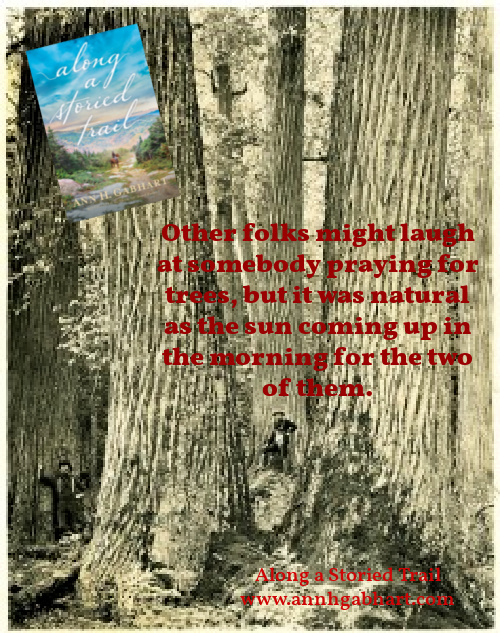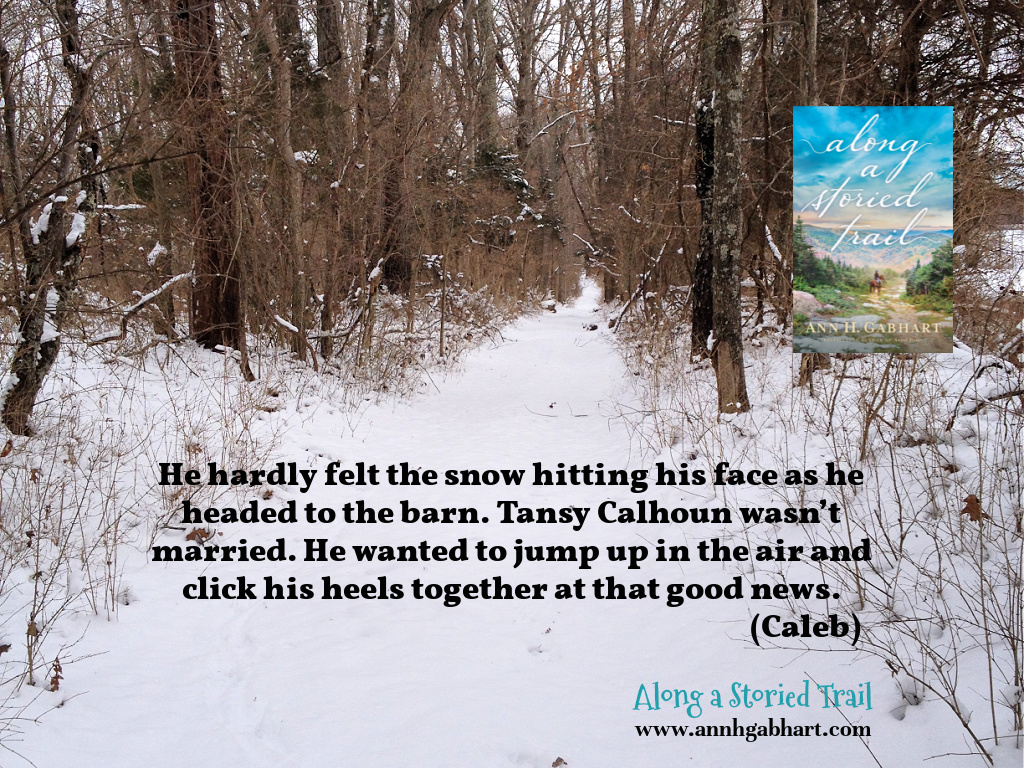I’ve been sharing a lot of my research and about my characters as I count down to the book birthday of Along a Storied Trail coming out on Tuesday, June 1. Some of you have already gotten your hands on a copy and I thank you for reading my packhorse librarian book. But the story didn’t only talk about the Packhorse Library WPA program. While that was the main focus of the historical background, while researching I kept finding more interesting programs implemented during the Great Depression to put people to work.
One of those was the Civilian Conservation Corps (usually shortened to CCC). This corps enrolled unskilled men between the ages of 18 and 25, most of whom were from families on government assistance. Men enlisted for a minimum of six months and it was something like enlisting in the army with the same kind of discipline expected. Each worker was paid $30 a month (equal to approximately $580 today) along with room and board in barracks at the work camps. But the young men didn’t keep all their pay. They were required to send $25 home each month to help their families.
Maximum enrollment at any one time was 300,000. Through the course of its nine years in operation, 3 million young men worked in the CCC doing outdoor work. This might be planting trees, flood control, building trails and picnic areas in National and State Parks, building bridges, fighting fires and similar jobs. Many of those who enrolled were poorly educated and often destitute. Few had work experience beyond occasional odd jobs. In the Corps, they learned new skills and many who were illiterate learned to read. Peace was maintained by the threat of “dishonorable discharge.”
One newsletter boasted, “This is a training station; we’re going to leave morally and physically fit to lick ‘Old Man Depression.'”
So when I needed a reason for Caleb, one of my male characters, to be gone from the mountains for a while, I sent him off the CCC to work in the newly established Smoky Mountain National Park. I let him plant trees and build trails. Caleb Barton is a character I hope those who read my story will like getting to know. While he’s educated more than most of those who joined the CCC, he was anxious to find a job where he could work outside. Before he left for the CCC, he and Tansy talked about the American Chestnut trees and mourned that they were dying. It seemed natural for them to pray the tide would turn and the chestnuts would survive.
I don’t think those of us who never saw those gigantic trees can really understand the impact of the loss of those trees in the Appalachian Mountain range. The picture up top shows how large those trees could get. The mountain people depended on the chestnuts to feed their stock and themselves along with bringing in cash when they gathered them to sell in the cities.
Caleb’s story and Tansy’s too are intertwined with those trees and the mountains. I hope readers will cheer Caleb on as he tries to find a way to win Tansy’s heart.
Thanks for reading.
Does reading historical novels make you want to know more about the history background in the stories? Have you ever done some more research on your own after reading a novel?
Giveaway notice
Before I go, here’s a chance to win all these books – 40 of them, including my Along a Storied Trail. The deadline to enter is June 7, 2021, so get your entry in and you might get a load of books in the mail from some of your favorite authors. Check it out here.




Comments 16
I love learning history while enjoying a good story. Yes, I often research more on my own. Thank you for sharing. Blessings
Author
That is a great thing about reading historical fiction. It’s a great way to be introduced to parts of history you don’t know about or know very much about. I always love to see your comments, Lucy. As soon as I finish editing my work in progress, I hope to do a Mystery Picture Game. I know you say you aren’t good at that, but you can still have some fun.
My father worked with the CCC and had alot of stories to share. This is Ann’s best book by far, but the Shaker’s hold a special place in my heart.
We are ready for book 2 need to see if the school was re-built ! Read this in 2 day’s a book you cannot put down !!!
Author
Thank you, “Sister Edna.” You did love those Shaker sisters, even the ones who weren’t very nice. LOL. I’m glad you enjoying this mountain story too. I appreciate you thinking I did a good job with this story. You’re a fun reading friend.
It’s a shame those chestnut trees died. I hear a few have been found that managed to survive and they’re trying to figure out how to get them back. Wouldn’t that be grand?
I couldn’t get the giveaway link to work. Oh well, I’m still going to read your book!
Author
I’m sorry about the giveaway link, Ola. I had trouble with it too, but the author who put it up says it’s working. Maybe it’s just us. But you can check out my new post I just put up and head over to the Simply Susan post and leave a comment there to have a chance at winning a copy of my book.
And it was a sorrow when all the trees died. At one time they said there were probably 25 million American Chestnut trees in the Appalachian regions and now there might be 100 that survived. But scientists are working on finding a way to bring them back, and that would be grand.
CCC Camp. Upon graduation from. IU and marriage to our mother in 1933 our dad was employed by the CCC. In 1940 he joined the Army and made a career of it retiring in 1960 the year I was married. I researched the chestnut trees before I was halfway through with the book. So sad!!! Like the Elm tree during my time. Not as devastating , though. Thank you for your beautiful stories. Historical novels are on of my favorite genre. A fun way to learn history. Have a safe Memorial Day.
Author
I love hearing about people who were part of the work programs during the Great Depression, Karen. I liked researching that and seeing how many people were helped and while they got jobs the country got a lot of other good results out of the work programs like new building and bridges. But in the Eastern KY Mountains, maybe one of the best things was how many people discovered the joy of books and reading.
I love that you brought up a valid point about the Chestnut trees in your story. Gives a little more food for the fodder while reading your story. I even discussed that issue with my husband who loves history and especially KY history. Thanks for adding such a realistic feature to your story. I’m loving it so far. Love all your books. Have a wonderful day and I hope to see you on Saturday!
Author
Thank you, Amy, for reading my books. Hope you and your husband had a good discussion about the history of the Chestnut trees. The experts are trying to bring them back by crossing them with resistant chestnut trees like the Chinese Chestnut. Perhaps they will conquer the deadly tree fungus yet. Now the trees will sprout and grow but when they get a certain size they generally die. The problem is that the fungus harbors in certain oak trees although it doesn’t hurt them. It came to America in Chinese Chestnuts. Those trees are also unhurt by the fungus.
Until reading your blog and Along a Storied Trail, I didn’t realize how important the chestnut trees were to the mountain people in feeding themselves and their livestock as well as bringing in some cash as they sold the chestnuts to city people. What a terrible loss they would have sustained from the death of these trees, which were a natural resource that God had provided for them!
Author
The loss of the American Chestnuts did change the mountains and the ability of the mountain people to make their way as farmers, Suzanne. Most of them lived off what they could raise themselves and the chestnuts made a supplemental food supply for their stock and themselves. But the loss was more than just that. They had the emotional loss of seeing all those trees die. I read that the American Chestnuts made up 30% of the forests. So one out of three trees died.
Good Morning Ann,
I dive into a new book head line and sinker. Many times I don’t/can’t wait to know more about the history of a story, and will do more research as I read. However, once I reach the point where the research and story meet I stop so it doesn’t spoil the author’s book for me. I hate to know what is going to happen before it actually does in the story.
Hi Ann….Historical fiction is a favorite genre for me, as are any books about history. I had not known about the chestnut trees until we reconnected with an old classmate whose hobby was woodworking and he had some articles he had made from reclaimed chestnut wood and he told us about the plight of the trees. We bought an article he had made from the chestnut wood . It is truly a great loss and I am glad you wrote about it. I did not realize how important the chestnuts were as a food source. I always do a little research when I read anything of history, because it always piques my interest. Regarding the CCC, when I was a child, my Dad spoke of working in the CCC in Arkansas, and I wish now I had paid more attention to his stories.
Author
I’m like you, Lynda, that I wish I had paid more attention to the stories my older family members told or asked more questions. I did get my mother to talk a lot about her growing up years but not as much about her young married years. Of course, I used those growing up years’ stories in Angel Sister.
I included the plight of the Chestnut trees after visiting a library in Eastern Kentucky. The librarian there told me I didn’t have a story if I didn’t talk about the trees. So I started researching.
I like it when readers do their own research after reading my books.
Author
I love reading books like that, Adriann. Head line and sinker. I don’t always get to do that while I’m working on writing a book. Sometimes I think it might be nice to retire from writing and just read and read and read. But then I start writing a new story. 🙂
I hadn’t thought about researching the history maybe being a spoiler for the story. But I guess in some of my books that might have been true. Say, in Words Spoken True, although the characters’ actions wouldn’t have been known by knowing the history. Interesting thought, though.